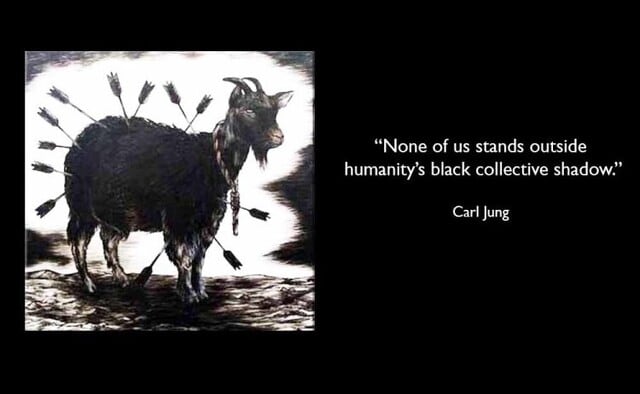
最も簡単な方法は、私たちが他の人に嫌いなすべての資質をリストすることです。 たとえば、うぬぼれ、短い
気性、わがまま、マナーの悪さ、貪欲など。
リストが最終的に完成したとき(そしておそらくそれは
かなり長くなります)、それらの特性を抽出する必要があります
私たちは他人を嫌うだけでなく、嫌い、嫌い、そして
軽蔑する。
この短い最終リストはかなり正確になります
私たちの個人的な影の写真。 これはおそらく信じがたいことであり、
受け入れるのが難しい。
-ウィリアムA.ミラー、影に出会う
The simplest method is to list all the qualities we do not like in other people; for instance, conceit, short
temper, selfishness, bad manners, greed, and others.
When the list is finally complete (and it will probably
be quite lengthy), we must extract those characteristics
that we not only dislike in others, but hate, loathe, and
despise.
This shorter final list will be a fairly accurate
picture of our personal shadow. This will probably be very hard to believe and even
harder to accept.
- William A. Miller, Meeting the Shadow
カール・ユングが語る「悪の投影」とは
私たちは、その人間性のおかげで、常に潜在的な犯罪者である。
実際には、地獄の戦いに引き込まれる適切な機会がなかっただけなのです。私たちは誰もが人類の黒い影の外にいるわけではありません。
犯罪が何世代も前のものであれ、今日起こったものであれ、それは常にどこにでも存在する性質の症状であり、それゆえ、人は「悪の想像力」を持つことが望ましい。
実際、この怠慢こそが、彼を悪の道具にするための最良の手段なのである。
無害さや無頓着さは、コレラの患者やその周辺の人々が病気の伝染性を意識しないでいるのと同じように、ほとんど役に立たない。
それどころか、認識されていない悪を「他者」に投影してしまうことになる。
なぜなら、この投影は、私たちが自分の悪に対して無意識に密かに感じている恐怖を相手に伝え、相手の脅威の手ごわさを大幅に増大させるからです。
発見されなかった自己
http://jungcurrents.com/jung-collective-shadow-scapegoat-evil
Carl Jung speaks about the projection of evil
We are always, thanks to our human nature, potential criminals.
In reality we merely lacked a suitable opportunity to be drawn into the infernal melee. None of us stands outside humanity’s black collective shadow.
Whether the crime lies many generations back or happens today, it remains the symptom of a disposition that is always and everywhere present – and one would therefore do well to possess some “imagination in evil,” for only the fool can permanently neglect the conditions of his own nature.
In fact, this negligence is the best means of making him an instrument of evil.
Harmlessness and naïveté are as little helpful as it would be for a cholera patient and those in his vicinity to remain unconscious of the contagiousness of the disease.
On the contrary, they lead to projection of the unrecognized evil into the “other.”
This strengthens the opponent’s position in the most effective way, because the projection carries the fear which we involuntarily and secretly feel for our own evil over to the other side and considerably increases the formidableness of his threat.
The Undiscovered Self
www.DeepL.com/Translator(無料版)で翻訳しました。










